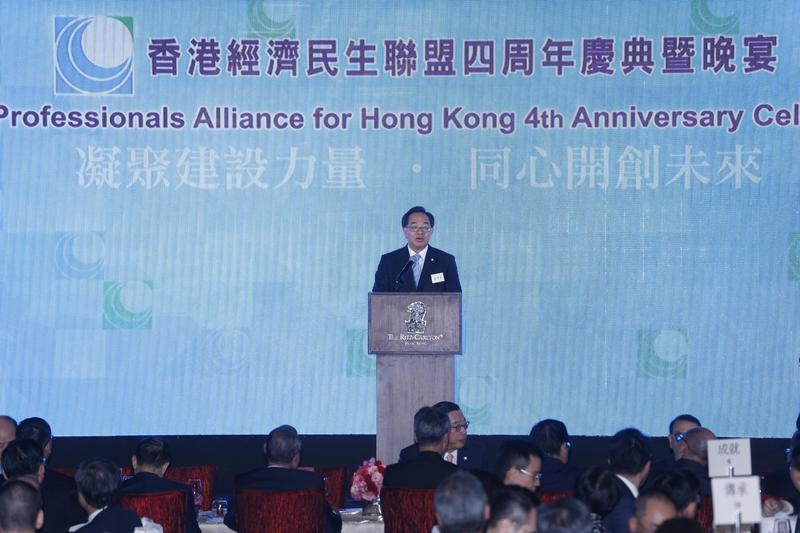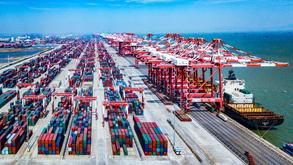Editor’s Note: It’s no doubt that Hong Kong’s future is intertwined with that of the nation’s. In the run-up to the Communist Party of China’s 20th National Congress, China Daily invites leaders from Hong Kong’s various sectors and professions to share their visions of the upcoming event and the city’s development. In this article, Lo Wai-kwok, lawmaker and the chairman of the Business and Professionals Alliance for Hong Kong, said he believes Hong Kong’s strengths in professional services and international ties can contribute to the country’s “dual circulation” and Belt and Road Initiative, adding Hong Kong engineers have much room to play a greater role in the nation’s future construction.
 Lo Wai-kwok, chairman of the Business and Professionals Alliance for Hong Kong speaks during The Business and Professionals Alliance for Hong Kong celebrates its 4th anniversary Banquet in Kowloon on Nov 1, 2016. (ROY LIU / CHINA DAILY)
Lo Wai-kwok, chairman of the Business and Professionals Alliance for Hong Kong speaks during The Business and Professionals Alliance for Hong Kong celebrates its 4th anniversary Banquet in Kowloon on Nov 1, 2016. (ROY LIU / CHINA DAILY)
![]()
1. The Communist Party of China’s 20th National Congress is about to begin. How do you view the development of the country and the city for the past decade? What about your sector? Any changes that impressed you the most?
China’s economy has grown by leaps and bounds over the past decade as the country has shifted its focus to high-quality development by enhancing its innovation efforts and macroeconomic policies. China has pushed its opening-up to a higher level, optimizing the business environment and ramping up Belt and Road cooperation. It has advanced the construction of 21 pilot free trade zones and signed Belt and Road cooperation documents with 149 countries and 32 international organizations.
Hong Kong’s most unique advantage is the implementation of “one country, two systems”, which is beneficial to all in the development of the country. We will ride on the golden opportunities available in the Guangdong-Hong Kong-Macao Greater Bay Area and the Belt and Road Initiative to actively participate in the domestic and international “dual circulation” and the nation’s 14th Five-Year Plan (2021-25)
Over the past decade, Hong Kong experienced many challenges and difficulties, leading to doubts from inside and outside about our role and contributions, and even about whether Hong Kong could continue to prosper. Our country has always been the strongest supporter of Hong Kong. Amid our difficult times in fighting the pandemic, our country offered Hong Kong a series of supporting measures.
Hong Kong’s most unique advantage is the implementation of “one country, two systems”, which is beneficial to all in the development of the country. We will ride on the golden opportunities available in the Guangdong-Hong Kong-Macao Greater Bay Area and the Belt and Road Initiative to actively participate in the domestic and international “dual circulation” and the nation’s 14th Five-Year Plan (2021-25).
Hong Kong’s engineering industry has a wide-range international experience and network, while the Chinese mainland counterparts have a better understanding of the mainland’s regulations and practices. Both parties can complement each other. Relevant preferential policies and opening-up measures have been introduced one after another.
In the past year, with the implementation of the National Security Law for Hong Kong and with the improved electoral system, Hong Kong has seen the back of the turbulent and chaotic situation, and society has gradually stabilized. This impressed me the most. The principle of “patriots administering Hong Kong” has become the mainstream consensus. The administration and legislation have also resumed effective interaction. These are all positive changes that are obvious to all. They also laid a solid foundation and shined bright prospects for the future development of Hong Kong.
ALSO READ: 20th National Congress: Ip spells out HK roles in nation's new era
2. Poverty alleviation is one of the key tasks of the CPC’s past decade’s work, which also came to fruition when the mainland got rid of absolute poverty. What can Hong Kong learn from the mainland’s poverty alleviation work when it is embroiled in a widening wealth gap?
We have to settle the various conflicts and problems facing Hong Kong’s development, eliminating the various chronic problems and deep-rooted conflicts that affect the improvement of Hong Kong’s social and political ecology, as well as effectively resolving the outstanding problems of housing, employment, healthcare, and the disparity between the rich and the poor.
The special administrative region government should follow the trend, set specific policy objectives, and take decisive measures to resolve the various kinds of deep-rooted conflicts that have existed in Hong Kong over the years.
It should particularly focus on issues of concern to the general public, including the runaway property prices, formulating fresh strategies for the comprehensive development of a diversified economy, the need to expand development opportunities for young people, the overburdened healthcare system, the widening gap between the rich and the poor, and other livelihood issues.
The government should take pragmatic and effective measures to resolve these problems and alleviate public grievances, as well as win the trust of the people with its performance in governance.
ALSO READ: China expects to deepen global cooperation against poverty
 Aerial photo taken on May 30, 2022 shows the Hong Kong-Zhuhai-Macao Bridge in south China. (LI GANG/ XINHUA)
Aerial photo taken on May 30, 2022 shows the Hong Kong-Zhuhai-Macao Bridge in south China. (LI GANG/ XINHUA)
The “Overall Plan for Deepening Globally Oriented Comprehensive Co-operation amongst Guangdong, Hong Kong and Macao in Nansha of Guangzhou” (Nansha Plan), positioned as a high-standard gateway for opening-up, is one of the major co-operation platforms in the Greater Bay Area, giving rise to more-favorable conditions for Hong Kong’s participation in the development of Nansha
3. President Xi Jinping’s report at the 19th CPC National Congress pointed out that the country has entered a new era of development, and the Party is striving to build a moderately prosperous society. What role do you think the Hong Kong SAR, especially your sector, could play in the country’s blueprint for the new era?
Hong Kong should reinforce and enhance its competitive advantages, to integrate into the overall development of the country and to proactively take forward the development of the Greater Bay Area.
After the central government announced the “Hengqin Plan” to enhance cooperation between Guangdong province and Macao, it also announced the plan of “Comprehensive Deepening Reform and Opening Up of the Qianhai Shenzhen-Hong Kong Modern Service Industry Cooperation Zone”. The total area of Qianhai has expanded to 120 square kilometers, which is eight times that of the original area.
The “Overall Plan for Deepening Globally Oriented Comprehensive Co-operation amongst Guangdong, Hong Kong and Macao in Nansha of Guangzhou” (Nansha Plan), positioned as a high-standard gateway for opening-up, is one of the major co-operation platforms in the Greater Bay Area, giving rise to more-favorable conditions for Hong Kong’s participation in the development of Nansha.
With Hong Kong’s leading position in professional service industries, it will allow tremendous opportunities for us to participate in projects in the Greater Bay Area, working alongside the local teams to achieve win-win scenarios.
ALSO READ: GBA eyes new growth drivers in closer economic and financial ties
4. What do you think a closer integration with the Chinese mainland for the past 10 years has brought to your industry? How do you perceive it will go, looking forward?
The strong support of national policy has actually helped us grasp the national development opportunities in, especially, giving play to Hong Kong’s unique advantages in promoting the development of the Greater Bay Area.
On promoting the development of a regional professional services hub, the amended Agreement on Trade in Services of the Mainland and Hong Kong Closer Economic Partnership Arrangement (CEPA) was implemented to give Hong Kong enterprises and professional sectors more-preferential treatment to tap into business opportunities in the mainland market.
Subsequently, Guangdong province announced its acceptance of the two lists of architectural and engineering consultants of the Development Bureau of Hong Kong, thereby allowing Hong Kong engineering construction consultant enterprises and professionals to directly provide services in the Greater Bay Area through a registration system.
Guangdong province announced its acceptance of the two lists of architectural and engineering consultants of the Development Bureau of Hong Kong, thereby allowing Hong Kong engineering construction consultant enterprises and professionals to directly provide services in the Greater Bay Area through a registration system
If government departments and industries in the two places could collaborate with concerted efforts for promoting early and pilot implementation in the Greater Bay Area, further relaxing the restrictions on Hong Kong people and enterprises in participating in mainland construction projects, deepening cooperation on infrastructural facilities, industry investment, I&T, environmental protection, testing and certification and arbitration services, I believe they will facilitate the development of the professional services sectors of the two places under the spirit of professionalism.
As for professional services, Hong Kong should be able to leverage its established advantages to complement the national development strategies and create more room for industries to grow in the market.
ALSO READ: HK, NZ move to boost cooperation under CEPA
5. For the past 10 years, many favorable policies were rolled out for Hong Kong and Macao residents. Is your industry one of the beneficiaries? What role do you think such policies play in helping your sector to grow stronger?
The nation’s 14th Five-Year Plan supports the strategy of high-quality development of the Greater Bay Area, and the Hong Kong government has been actively promoting the integration of Hong Kong’s construction and engineering sectors into the country’s overall development along this direction.
The measures announced by the Department of Housing and Urban-Rural Development of Guangdong Province with effect from January 1, 2021, cover four professional sectors in architecture, engineering, surveying and landscape architecture, which allow consultant firms on the two government lists and professionals registered with relevant registration boards in Hong Kong to directly provide services in the Greater Bay Area by obtaining equivalent qualifications in the mainland through a registration system.
Similar measures were also promulgated in Qianhai and Hengqin, which took effect from October 2020 and December 2019. In addition to the consultant firms on the two government lists, the measures also cover companies on the List of Approved Contractors for Public Works, as well as company members of the relevant professional institutions or associations.
Nansha will recognize the professional qualifications of Hong Kong architects, structural engineers and building surveyors who are members of their respective professional associations and institutes in Hong Kong. Hong Kong and Macao companies will be allowed to apply the construction management models from Hong Kong and Macao to development and construction projects undertaken in Nansha in the form of a sole proprietorship or holding company.
 This undated file photo shows a view of Nansha Port in Guangzhou, South China's Guangdong province. (PHOTO PROVIDED TO CHINA DAILY)
This undated file photo shows a view of Nansha Port in Guangzhou, South China's Guangdong province. (PHOTO PROVIDED TO CHINA DAILY)
The development of the Greater Bay Area is likely to require large investments in its existing transport, housing and commercial infrastructures. All of the major projects require the expertise of engineering consultancy firms, and their skills and experience from Hong Kong will give them a competitive edge. New construction projects, existing development, and maintenance work will require the input of highly skilled engineers
Operators and professionals with Hong Kong qualifications in architecture or a related engineering consultancy may provide services directly in Nansha once filing procedures have been completed. Nansha will also explore ways to actively attract the participation of Hong Kong and Macao professionals and international talent through serving on statutory bodies or by appointment.
Engineering professionals will take the Greater Bay Area development as an entry point to better integrate into the country’s overall development, thereby bringing continuous impetus to Hong Kong’s engineering and construction industry.
ALSO READ: Tax breaks for workers from HK, Macao SARs in Nansha
6. What are your expectations for Hong Kong’s participation and contribution to the nation’s development in the upcoming decade?
Hong Kong has taken advantage of the convergence of the five flows, namely, the flows of people, goods, capital, information and services. The key is that we must grasp new development opportunities in a timely manner.
Hong Kong provides different platforms (such as those for fundraising and financing, high-end professional services, emerging industries and business facilitation) to assist the Belt and Road development. Hong Kong’s strengths in financial services, professional services and international ties can also contribute to the transformation and upgrading of industries in the Greater Bay Area, building the Greater Bay Area into a world-class city cluster.
The Greater Bay Area will also play an important role in building the Belt and Road. Hong Kong’s engineering and construction sector will gain access to one of the world’s fastest-growing and innovative economic zones, along with its land, labor, capital resources and large market. Hong Kong engineers are better placed than any of our competitors to make the most of opportunities ahead. We have a well-trained and experienced workforce, which is capable of meeting infrastructure demands.
The development of the Greater Bay Area is likely to require large investments in its existing transport, housing and commercial infrastructures. All of the major projects require the expertise of engineering consultancy firms, and their skills and experience from Hong Kong will give them a competitive edge. New construction projects, existing development, and maintenance work will require the input of highly skilled engineers.
READ MORE: GBA medical staff to visit HK to ease health workforce shortage
The entire Greater Bay Area will be a hot spot for skilled engineers, and our reputation, training and background will give our local engineers a competitive advantage.


